Keynote Speakers of AMMS 2025
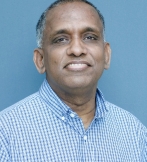
Prof. Saralees Nadarajah
University of Manchester, UK
Saralees Nadarajah is a Professor in the Department of Mathematics, University of Manchester, UK. His research interests include climate modeling, extreme value theory, distribution theory, information theory, sampling and experimental designs, and reliability. He is an author/co-author of four books, and has over 1000 refereed journal papers published or accepted. He has held positions in Florida, California, and Nebraska.

Prof. Gyu Myoung Lee
Liverpool John Moores University (LJMU)
Gyu Myoung Lee joined the Liverpool John Moores University (LJMU), UK in 2014, as a Senior Lecture in the department of Computer Science and was promoted to a Reader in 2017 and a Professor in 2020. He is also with KAIST Institute for IT convergence, Daejeon, Rep. of Korea, as an Adjunct Professor from 2012. Before joining the LJMU, he worked with the Institut Mines-Telecom, Telecom SudParis from 2008. Until 2012, he was invited to work with the Electronics and Telecommunications Research Institute (ETRI), Rep. of Korea. He worked as a research professor in KAIST, Rep. of Korea and as a guest researcher in National Institute of Standards and Technology (NIST), USA, in 2007. He worked as a visiting researcher in the University of Melbourne, Australia, in 2002. Furthermore, he also has work experience in industries in Rep. of Korea. His research interests include Internet of Things, Web of Things, computational trust, knowledge centric networking and services considering all vertical services, Smart Grid, energy saving networks, cloud-based big data analytics platform and multimedia networking and services. Dr. Lee has been actively participating in standardization meetings including ITU-T SG 13 (Future Networks and cloud) and SG20 (IoT and smart cities and communities), IETF and oneM2M, etc., and currently serves as a Rapporteur of Q16/13 (Knowledge centric trustworthy networking and services) and Q4/20 (e/Smart services, applications and supporting platforms) in ITU-T. He is also the chair of ITU-T Focus Group on Data Processing and Management (FG-DPM) to support IoT and smart cities & communities. He has contributed more than 300 proposals for standards and published more than 100 papers in academic journals and conferences. He received several Best Paper Awards in international and domestic conferences and served as a reviewer of IEEE journals/conference papers and an organizer/member of committee of international conferences. He is a Senior Member of IEEE.
Speech Title: "AI powered Trustworthy Decentralized Internet"
Abstract: Artificial Intelligence (AI) and Internet of Things (IoT) are very important technologies for the future, and recently there has been a lot of research activity to combine AI and IoT, called AIoT (Artificial Intelligence powered Internet of Things). In addition, data is becoming essential to support AI-based solutions with human interactions. Blockchain is revolutionizing the way transactions are recorded as a machine to create trust. In this context, this talk will introduce key concepts, features and characteristics of the Decentralized Internet (i.e., Web 3.0 and its vision as the Internet of Value), taking into account emerging ICTs integrating AIoT and Blockchain, and related EU projects such as GAIA-X. From the research on decentralized Internet research for Web 3.0, many researchers have recognized that there are security, privacy and trust concerns to realize a user-centric approach for decentralization. To cope with the negative effects of the decentralized Internet, it's necessary to build a trustworthy infrastructure with AI for the future digital economy toward the Internet of Value. Therefore, starting from the new economic paradigm for cyberspace, data ecosystem and its characteristics, this talk will present future directions for realizing decentralized Internet with AI-powered trust technology.
Invited Speakers of AMMS 2025
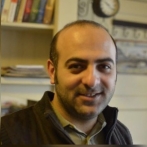
Dr. Gökhan Yıldırım
Bilkent University, Turkey
Dr. Gökhan Yıldırım is a faculty member at Bilkent University, Ankara, Türkiye. He earned his PhD in Applied Mathematics from the University of Southern California, USA. His research spans enumerative combinatorics, probability, statistical physics, and data science. Dr. Yıldırım has contributed to numerous collaborative research projects and published in prestigious peer-reviewed international journals, including Advances in Applied Mathematics, Nature Physics, Electronic Journal of Probability, and Electronic Journal of Combinatorics. His findings have been presented at leading international conferences and meetings worldwide. In addition to his research, Dr. Yıldırım is an experienced educator, regularly teaching courses in probability, statistics, discrete mathematics, and data science. He has also served on editorial and review boards of scientific journals and actively participated in program committees of international conferences.
Speech Title: "Sampling from Discrete Combinatorial Structures: Algorithms, Challenges, and Open Questions"
Abstract: Understanding the structure and properties of discrete combinatorial objects, such as pattern-avoiding permutations and inversion sequences, is a fundamental problem with applications across mathematics, statistical physics, and computer science. In this talk, I will explore sampling algorithms designed to efficiently generate these complex structures. Special emphasis will be placed on Markov Chain Monte Carlo (MCMC) methods, which have become indispensable tools for approximate sampling in high-dimensional combinatorial spaces. I will discuss the strengths and limitations of these algorithms, highlighting recent advancements and illustrating their practical performance. Additionally, several open questions will be presented, offering insight into ongoing challenges in the field and potential directions for future research. This talk aims to provide an accessible overview of the theoretical underpinnings, computational techniques, and open problems related to sampling from discrete combinatorial structures.

Dr Chris G. Antonopoulos
University of Essex, UK
Dr Antonopoulos earned his BSc in Mathematics from the University of Crete, Greece, in 1999. In the same year, he joined the Department of Mathematics at the University of Patras, Greece, where he completed an MSc in Applied Mathematics in 2002 and a PhD in 2007. His doctoral research focused on the analytical and numerical study of stability and chaos in multi-dimensional Hamiltonian systems, investigating their transition from classical to statistical mechanics. Dr Antonopoulos is the author of 58 peer-reviewed journal articles, 3 editorials, and 9 publications in conference proceedings and book chapters. He has delivered 58 talks at international conferences, universities, and academic institutes, including 22 invited lectures. His work has received significant recognition, with an h-index of 24 and 2,776 citations (Google Scholar). Dr Antonopoulos has successfully supervised 1 MSc and 3 PhD students and is currently supervising 2 PhD candidates. He is a member of the London Mathematical Society (LMS) and the Institute of Mathematics and its Applications (IMA). Since July 2020, he has served as the IMA Representative for the School of Mathematics, Statistics and Actuarial Science (SMSAS) at the University of Essex.
Speech Title: "Network Inference Combining Mutual Information Rate and Statistical Tests"
Abstract: In this talk, we introduce a novel method that integrates information-theoretical and statistical techniques to infer connectivity in complex networks using time-series data. Grounded in Shannon entropy, the approach estimates the Mutual Information Rate between pairs of time-series and applies statistical significance tests using the false discovery rate method for multiple hypothesis testing to determine connectivity. We present the mathematical framework and demonstrate the method’s efficacy through applications to various systems, including correlated normal variates, coupled circle and logistic maps, coupled Lorenz systems, and coupled stochastic Kuramoto phase oscillators. We further explore the impact of noise on the methodology for networks of coupled stochastic Kuramoto oscillators and the influence of coupling heterogeneity on networks of coupled circle maps. Using receiver operating characteristic (ROC) curves, we show that the method accurately identifies connected nodes and pairs. In the context of stochastic data, it effectively reconstructs the original connectivity structure. Moreover, the methodology is shown to recover connectivity matrices for dynamics on Erdős-Rényi and small-world networks with diverse coupling heterogeneity. A key strength of this approach is its ability to infer the underlying network connectivity solely from recorded datasets, making it applicable to a wide range of fields, including functional network inference in neuroscience, financial market analysis, and social media networks. This versatility underscores its potential for analysing any network derived from time-series data.
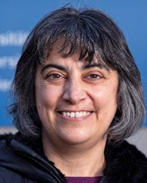
Assist. Prof. Paola Lecca
Free University of Bozen-Bolzano, Italy
Paola Lecca is a theoretical physicist with a PhD in Computer Science and Telecommunication. Dr. Lecca is Assistant Professor at the Faculty of Engineering of the Free University of Bozen-Bolzano (Italy), where she carries out research activities in the fields of graph theory, modelling and analysis of dynamic networks, statistical inference, parallel computing, mainly in the application domains of bioinformatics, computational biology, biophysics and drug development. Dr. Lecca’s interests and scientific contributions relate to the mathematical foundations of data analysis, artificial intelligence and modelling techniques for complex systems that can be represented as networks of dynamic interactions. A member of various national and international scientific associations, Paola Lecca has also authored over a hundred articles in international scientific journals and conference proceedings in computational biology, biophysics and applied mathematics.
Speech Title: "The Bayesian basis of Decision-Making in Artificial Intelligence: Does It Help to Determine the Level of Confidence in Artificial Intelligence Results?"
Abstract: Artificial Intelligence systems can explicitly model uncertainty thanks to Bayesian statistics. Bayesian models produce a probability distribution over potential outcomes rather than a single deterministic output. By capturing the inherent uncertainty in data and model projections, this probabilistic approach facilitates risk assessment and well-informed decision-making. Furthermore, Bayesian decision theory provides a structured framework for making optimal decisions under uncertainty. However, the uncertainty in the prior probability function and background knowledge cannot be handled or represented generally by the Bayesian approach. This is a significant theoretical and practical drawback of Bayesianism. These limitations of the Bayesian approach will be presented and discussed in the talk and some perspectives will be given on the need to go beyond traditional Bayesianism.
Assoc. Prof. Ahmad Lutfi
Amri Ramli
Universiti
Sains Malaysia, Malaysia
Assoc. Prof. Dr. Ahmad Lutfi Amri Ramli is an esteemed academic at the School of Mathematical Sciences, Universiti Sains Malaysia (USM). He holds a PhD from Durham University, an MSc from Brunel University, and a BSc in Mathematics from USM. Dr. Lutfi’s research expertise lies in applied mathematics, with a focus on motion planning for robots integrating the knowledge from computer aided geometrical design, curve and surface modelling, and computational methods. His interest also extends to gamification in education, leveraging innovative approaches to enhance student engagement in mathematical learning As an academic leader and researcher, Dr. Lutfi has been actively involved in advancing research, fostering student development, and innovating teaching practices, contributing to the growth of mathematics and applied sciences.
Speech Title: "CAGD and Its Application in Transportation Research"
CAGD is used in transportation research for road design, vehicle trajectory planning, speed estimation, and optimizing autonomous navigation paths. It also enables the creation of smooth and efficient road alignments while ensuring safety and comfort. This talk will highlight a few key applications, such as safe speed estimation using parametric curves derived from GPS data and travel time prediction based on circular arc curvature to estimate speed from road geometry. These techniques provide valuable insights for traffic management and infrastructure development. By applying CAGD techniques, transportation research can leverage mathematical models to improve accuracy while reducing costs.
Previous Speakers
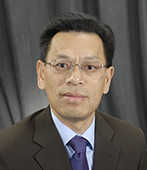
ASA Fellow, Prof. Ding-Geng Chen
University of North Carolina-Chapel Hill, USA
Professor (Din) Ding-Geng Chen is an elected fellow of the American Statistical Association (ASA) and an elected member of the International Statistics Institute (ISI). He is currently the executive director and professor in biostatistics at the College of Health Solutions, Arizona State University, USA. He is also the South Africa Research Chair Initiatives (SARChI) Tier-1 research chair in biostatistics established by the Department of Science and Technology (DST), National Research Foundation (NRF), and South Africa Medical Research Council (SAMRC), to lead the research, development and capacity building in biostatistics across Africa, an extraordinary professor at the Department of Statistics, University of Pretoria, South Africa, and an honorary professor at the School of Mathematics, Statistics and Computer Science, University of KwaZulu-Natal, South Africa. Professor Chen served as a distinguished professor in biostatistics at the University of North Carolina-Chapel Hill, a biostatistics professor at the University of Rochester Medical Center, the Karl E. Peace endowed eminent scholar chair in biostatistics from the Jiann-Ping Hsu College of Public Health at the Georgia Southern University, and a professor in biostatistics at the South Dakota State University. His research has been funded by NIH/NSF with more than 200 professional publications and 33 co-authored/co-edited books on biostatistics clinical trials, biopharmaceutical statistics, interval-censored survival data analysis, meta-analysis, public health statistics, statistical causal inferences, statistical methods in big-data sciences, and Monte-Carlo simulation-based statistical modeling. He has been invited internationally to give scientific speeches, short courses, and tutorials at various scientific conferences.
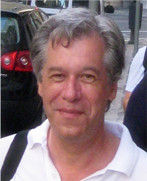
Prof. Carlos A. Coelho
NOVA University of Lisbon, Portugal
Carlos A. Coelho is a Full Professor of Statistics at the Mathematics Department of Faculdade de Ciências e Tecnologia of NOVA University of Lisbon. He holds a Ph.D. in Biostatistics by The University of Michigan, Ann Arbor, MI, U.S.A., and his main areas of research are Mathematical Statistics and Distribution Theory, namely the derivation of Likelihood Ratio Tests for elaborate structures of covariance matrices and for MANOVA-like models under the assumption of elaborate covariance structures, as well as the study and development of exact and near-exact distributions for these and other likelihood ratio test statistics used in Multivariate Analysis. Other areas of interest are Estimation, Univariate and Multivariate Linear, Generalized Linear and Mixed Models, etc. Carlos A. Coelho is an Elected Member of the International Statistical Institute and has served as Associate Editor in the Editorial Boards of REVSTAT and Journal of Interdisciplinary Mathematics and currently serves in the Editorial Boards of Journal of Applied Statistics, Journal of Statistical Theory and Practice, American Journal of Mathematical and Management Sciences and Discussiones Mathematicae-Probability and Statistics and is Associate Editor of the Springer Book series “Emerging Topics in Statistics and Biostatistics”. Carlos A. Coelho, a Fulbrighter, is also vice-president of Fulbrighters Portugal – the Portuguese Fulbright Alumni Association.
Assoc. Prof. S. Joseph Antony
University of Leeds, UK
Dr S. Joseph Antony is an Associate Professor at the School of Chemical and Process Engineering, University of Leeds, U.K. His research expertise is in the area multi-scale modelling and experimental mechanics of materials in both discrete and continuum form. He has a strong expertise in materials modelling including MD, DEM, FEM and analytical methods. His experimental approaches include a wide variety of advanced characterising and stress sensor techniques including photonics (PSA), AFM, SEM, PSAT and IR tomography, and DPIV. He focuses on linking the effects of material properties at exceedingly small scales (molecular/nano/micro) to bulk scale mechanical, electrical and chemo-mechanical properties in a wide variety of engineering applications. Joseph has published over 150 papers in several reputed international journals and conference proceedings. He actively participates in the activities of particle technology community in U.K and abroad. He has won many awards, including the prestigious M.I.T Young Research Fellowship for Exemplary Research in Computational Mechanics and the Certificate of Merit as an Example of Outstanding Achievements in U.K Particle Science and Technology in 2002, PTSG, IChemE, U.K. He has served as a guest editor for the Jl. Granular Matter and the lead editor of the book ‘Granular Materials: Fundamentals and Applications’, published by the Royal Society of Chemistry, London in 2004. His research sponsors include EPSRC, Royal Society, DTI, ICI, BNFL, P&G, Pfizer, Borax Hosakawa Micron, Bridon International Ltd, Merck Sharp & Dohme and DuPont (U.K). More details on his research activities can be found in: http://www.spanglefish.com/drsjosephantony/.
.
Copyright © AMMS 2026. All rights reserved.